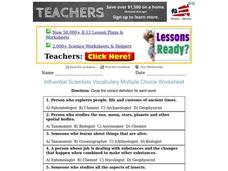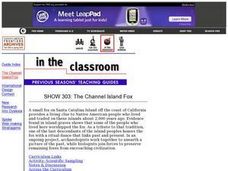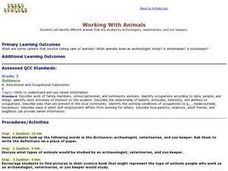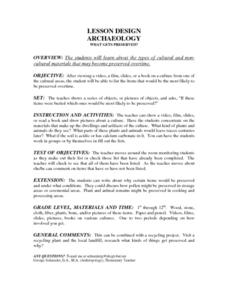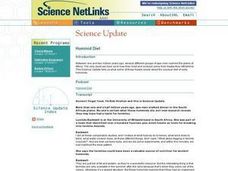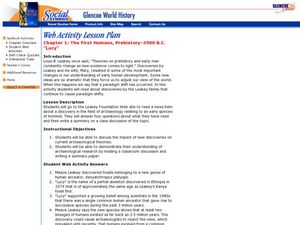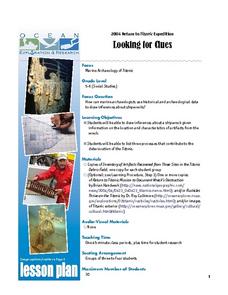Curated OER
Influential Scientists Vocabulary Multiple Choice Worksheet
In this influential scientists worksheet, students read the definitions of 19 science professions. From 4 choices, students choose the correct name of the job that fits the definition. Example: studies birds (ornithologist).
Curated OER
Contextual Clues
Learners observe and interpret images of artifacts in different contexts in order to recognize importance of leaving artifacts in original context to correctly understand their meaning, and observe what is surrounding object to interpret...
Curated OER
Can You Dig It?
Students use a mock archaeological site to dig up artifacts. They read an article about artifacts found in Syria. They develop a list of artifacts that are related to specific sites in the community. They create an exhibition of these...
Ocean Explorer
Looking for Clues
Upper graders become "shipwreck detectives" by studying the debris field from a shipwreck in the Aegean Sea which took place in the 700s. A website is accessed that gives specific information about the debris field, and pairs of...
Curated OER
Replacing Missing Links in the Evolutionary Chain
Examine the evolution of various species of hominids from their earliest existence approximately 4.5 million years ago to today. In small groups, learners research one of the ten stages of hominid evolution and then create a poster and...
American Museum of Natural History
Being an Archeologist: Chuck Spencer
Meet Chuck Spencer, an archeologist who studies the Zapotec people who lived in the Valley of Oaxaca, Mexico over 2000 years ago. Spencer shares in print his response to questions posed by kids.
American Museum of Natural History
Create Your Own Time Capsule
The corona virus pandemic is indeed a historic event. A time capsule activity permits young historians to document these days of social distancing, remote learning, and quarantine by collecting artifacts that capture what their lives are...
Channel Islands Film
Once Upon a Time (Saxipak’a): Lesson Plan 4
How did the environment and natural resources found on the Channel islands influence the culture of the Chumash? Archaeology meets technology in an activity designed for middle schoolers. After viewing West of The West's documentary Once...
Curated OER
Archaeological Finds
Students demonstrate the goals and methods of archaeology and write a report of an archaeological dig at a site associated with a specific culture. They explore the science of archaeology and how it contributes to the understanding of...
Curated OER
SHOW 303: The Channel Island Fox
Students explore how archaeologists and other scientists use different clues to piece together a picture of the past. Students perform activities that allow them to conduct three types of scientific research. They discuss their...
Curated OER
Working With Animals
Second graders study careers that involve animal care such as veterinarians, zookeepers and archeologists. They create a collage of animal drawings related to the careers.
Curated OER
Predicting the Past
Students study how archaeologists record the past. They discuss archaeology and artifacts. They view a list of artifacts discovered by Marquette at the Illinois Village and answer questions regarding them. They complete a test about...
Curated OER
Digging in the Classroom
First graders "excavate" a story. In this creative earth science lesson, 1st graders become archaeologists and dig through a box of dirt or other material to find pictures from a picture book. It is their job to then put them in order.
Curated OER
Kincaid Shelter Stratigraphy
Seventh graders illustrate how archeologists use stratigraphy to help determine environmental changes in a specific area since the Pleistocene Era, and to point out that these changes have affected the animals living in that area.
Curated OER
Super Scientists Bingo
In this science worksheet, students select twenty-five scientists from the list to fill in their bingo card. Then they match each of the scientists listed to their correct description strip.
Curated OER
Archaeology What Gets Preserved?
Students view a video on a culture and list what would be preserved over time. In this investigative lesson students study preservation and what gets preserved in different cultures.
Curated OER
Shipwreck Mystery
Students study web pages on a shipwreck then locate where this took place on a map. In this marine archaeologist lesson students examine what clues archaeologists use to find the location of a shipwreck and what they might find.
Curated OER
Hominid Diet
Students listen to an interview with Lucinda Backwell regarding fossil evidence that early hominids included termites in their diets. They participate in a discussion to investigate the significance of these findings.
Curated OER
Preservation Through Education: Activities and Programs
Students participate in different activities to help them discover the need for preservation. They pretend they are underwater archaeologists and create a sketch of a mock shipwreck in their classroom. They label the parts of the ship as...
Curated OER
An Exercise in Seriation Dating
Students study the different types of artifacts found that were made by the colonial people. In this archaeology lesson students take part in finding ceramic and charting their results.
Curated OER
Classification and Attributes
Students classify objects based on their attributes. They explain how archaeologists use classification to help answer research questions.
Curated OER
The First Humans: Prehistory-3500 B.C. "Lucy"
Students explore prehistoric times by completing web activities in class. In this human ancestry lesson, students identify the archaeological discovery of the "Lucy" skeleton and what it meant for science. Students investigate the Leakey...
Curated OER
Titanic: Looking for Clues
Young scholars make inferences about a shipwreck based on the location of artifacts. They role play as marine archaeologists and list three processes that contribute to the deterioration of the Titanic.
Curated OER
Super Scientist Quiz
In this science worksheet, students match each of the descriptions on the right to the correct scientist listed on the right. There are thirty scientists to identify and match on the sheet.


